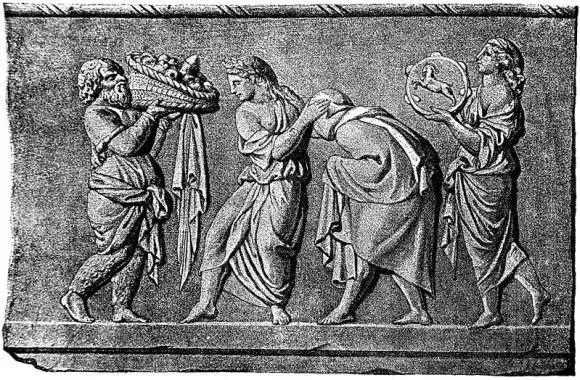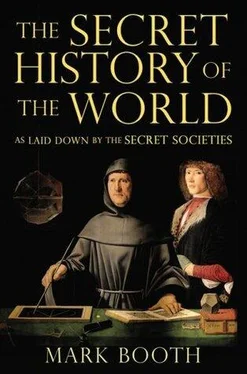Today we tend to be very proprietorial about our thoughts. We want to take credit for originating them, and we like to think that our private mental space is inviolate, that no other consciousness can intrude on it.
However, we don’t need to dwell on these assumptions long to see they don’t always fit experience. If we are honest we must admit we do not invariably construct our thoughts. It’s not just that geniuses like Newton, Kepler, Leonardo, Edison and Tesla talk of inspiration coming to them, as if in a dream and sometimes literally in a dream. For all of us it is the case that everyday thoughts naturally just come to us too. In common parlance we say ‘It strikes me that…’ and ‘It occurs to me that…’ If you’re lucky it may happen now and then that a perfectly phrased quip comes to you that sets the table aroar. Then of course you’re happy to bask in the glory — but the unvarnished truth is that the quip probably just jumped up and out of your mouth before you had any time consciously to phrase it.
The reality of everyday experience is that thoughts are quite routinely introduced into what we like to think of as our private mental space from somewhere else. The ancients understood this ‘somewhere else’ as being some- one else, the someone being a god, an angel or a spirit.
And an individual is not always prompted by the same god, angel or spirit. While today we like to think of ourselves as each having one individual centre of consciousness located inside the head, in the ancient world each person experienced him or herself as having several different centres of consciousness originating outside the head .
We saw earlier that gods, angels and spirits were believed to be emanations from the great cosmic mind — Thought-Beings in other words. What I am asking you to consider now is that these great Thought-Beings expressed themselves through people. If today we naturally think of people thinking, in ancient times they thought of Thoughts peopling.
As we shall see later on, gods, angels and spirits can bring about great changes in a nation’s fortunes. The focus of these changes will often be an individual. For example, Alexander the Great or Napoleon were vehicles for a great spirit, and for a while carried all before them in a remarkable way. No one could oppose them and they succeeded in everything they did — until the spirit left them. Then quite suddenly everything began to go wrong.
We see the same process in the case of artists who become vehicles for the expression of a god or spirit for a certain period of their lives. Then they seem to ‘find their voice’ and create masterpiece after masterpiece with a sure hand, sometimes transforming the consciousness of a whole generation, even changing the whole direction of a culture in history. But when the spirit leaves, an artist never again creates with the same genius.
Similarly if a spirit weaves through an individual to create a work of art, the same great spirit may once again be present whenever that work of art is contemplated by others. One of his contemporaries said: ‘When Bach plays the organ, even God comes to Mass.’
Today many Christians believe that God is present in the blood and wine at the climax of the Mass, albeit in a rather elusive way which centuries of theological debate have never quite managed to pin down. On the other hand if you read liturgies that have survived from ancient Egypt, notably The Book of the Opening of the Mouth , or consider chronicles kept in the temple of the Vestal Virgins in Rome that record the regular ‘epiphanies’, or appearances of the gods, it is quite clear that in those days the gods’ presence was expected at the climax of religious ceremonies — and in a far more imposing way than in Christian services today. The people of the ancient world experienced the gods’ presence as awe-inspiring.
When a thought came to the man walking through the woods, he felt as if he had been brushed by the wing of an angel or by the robe of a god. He sensed a presence even if he could not always perceive it directly and in detail. But once inside the holy precinct, he could perceive not just the wing, not just the swirling waves of light and energy that made up the robe. In the midst of the light he saw the angel or god itself. On these occasions he would have believed that he really was perceiving a being from the spiritual realm.
Today we experience moments of illumination as interior events, while the ancients experienced them as impinging on them from outside. The man we have been following expected the Thought-Being he saw to be visible to others — what today we would call a collective hallucination.
We don’t know how to go about having such an experience. We don’t know how to go about meeting a disembodied spirit. We don’t know who they are. Today it often seems that we search and search for a genuine spiritual experience but are seldom sure we’ve had one that genuinely deserves the name. In the ancient world experience of spirits was so strong that to deny the existence of the spirit world would not have occurred to them. In fact it would have been almost as difficult for people in the ancient world to deny the existence of spirit as it would for us to decide not to believe in the table, the book, in front of us.
Paucity of experience makes belief in disembodied spirits difficult today. In fact the Church teaches that belief is admirable because it is difficult. The more your belief is out of proportion to the evidence the better, it seems. This teaching would have seemed absurd to people in the ancient world.
IF YOU BELIEVE IN A MIND-BEFORE-MATTER universe, if you believe that ideas are more real than objects as the ancients did, collective hallucinations are, of course, much easier to accept than if you believe in a matter-before-mind universe — in which case they are almost impossible to explain.
In this history gods and spirits control the material world and exercise power over it. We will see, too, how sometimes disembodied beings break through, unbidden. Sometimes whole communities are possessed by a convulsion of uncontrollable sexual savagery.
This is why commerce with the spirits was always considered highly dangerous. In the ancient world controlled communion with the gods and spirits was the preserve of the Mystery schools.
ROBERT TEMPLE, WHOSE CURRENT affiliations include Visiting Professor of Humanities, History and Philosophy of Science, University of Louisville, USA, and Visiting Professor of the History and Philosophy of Science, Tsinghua University, Beijing, has demonstrated that ancient cultures such as the Chinese and the Egyptians had an understanding of the universe that was in some ways in advance of our own. For example, he has shown that the Egyptians, far from being primitive or backward in these matters, knew that Sirius is a three-star system — something which modern science only ‘discovered’ in 1995 when French astronomers, using powerful radio telescopes, detected the red dwarf, subsequently named Sirius C. The point is that the ancient Egyptians were neither ignorant nor childlike, even though we may be tempted to consider them so.

First-century Roman relief of a candidate being led to an initiation ceremony.
One of the stupid beliefs we are fond of attributing to the ancients is that they worshipped the sun, as if they believed the physical object were a sentient being. Robert Temple’s commentary on key texts by Aristotle, Strabo and others shows they saw the sun as a sort of lens through which the spiritual influence of a god rayed from the spiritual into the earthly realm. Other gods rayed their influences through the other planets and constellations. As the positions of the heavenly bodies changed, so the various patterns of influence give history direction and shape.
Читать дальше













